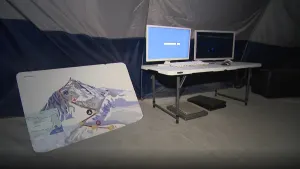More Stories
In the wake of George Floyd’s murder last year, Newark Mayor Ras Baraka announced that the city would divert 5% of its police budget to community-based antiviolence programs.
One such program is happening this summer in areas of the city that have seen their share of hardships.
Todd Carter just recently came home to Newark after spending eight years in federal prison for dealing drugs.
“As soon as they put you back in the world they expect you to be this new person. To go get a job and change your life,” he says. “And you’re stuck. You don’t know how to do that.”
Takieyah Reeves was shot twice at a nightclub in 2017 and nearly died.
“I ended up in the hospital on life support. I coded like about seven times during seven operations,” she says.
Carlos Smith is trying to find his footing after losing his job at Walmart weeks before his 20th birthday.
“Something negative always happens to be around my birthday,” he says.
Each of these individuals was recently hired by the city for a unique summer job – getting their lives back on track.
“It’s an earn and learn type of program,” says Lakeesha Eure, the director of the Newark Office of Violence Prevention and Trauma Recovery.
The program is called the Safe Summer Academy. At four sites in the city's toughest neighborhoods, 120 people, age 14 and up, are paid $15 an hour to attend workshops and classes in overcoming trauma, managing finances, starting businesses and other skills. Each is teamed with a case manager or social worker.
“The way that we approach this is from a public health lens. We understand that people have social, emotional issues, mental health issues. That depression and stress and all of those things are real areas and places that our people are struggling with,” says Eure. We need to put some supports around them.”
With so much debate over the phrase “Defund the Police,” Newark is providing a first glance at what that may look like.
“We don’t say that we are defunding the police. We are refunding the people,” says Eure.
One part of the program that's not on any syllabus is the hope and inspiration the participants can get from each other - from fellow academy members like Reeves, who after recovering from being shot, went on to earn her associates degree and then her bachelor degree in criminal justice from Rutgers University.
“When I go see the doctors, they’re like, ‘Wow, you’re not supposed to be here,’” Reeves says. “But I am supposed to be here. I have a story. I have a testimony. We all do. We’ve all been through tragic stuff. I just want to take what happened to me and turn it into something good…so that’s why this program is really helping me.”
The program just began last week and runs for seven weeks this summer.
More from News 12
1:31

What's Cooking: Uncle Giuseppe's Marketplace's prime rib roast
1:30

Looking for a road trip? Check out Big Snow at American Dream in East Rutherford
1:27

What's Cooking: Uncle Giuseppe's quiche lorraine
2:34

Guide: Safety tips to help prevent home burglaries
2:19

Guide: Safety measures to help prevent fires and how to escape one
2:36
